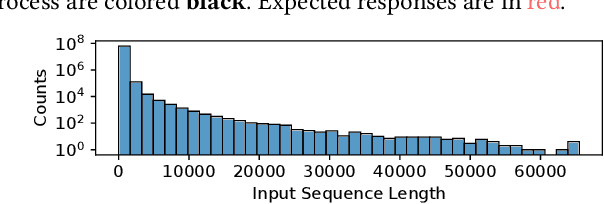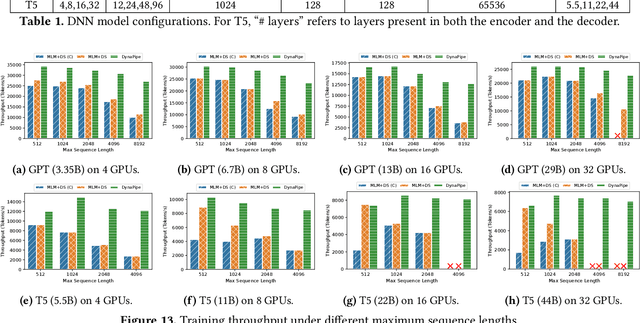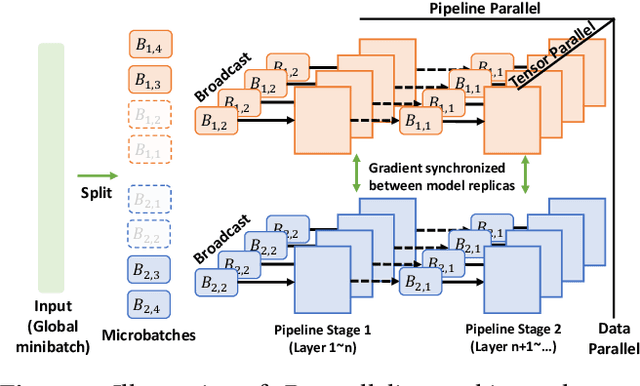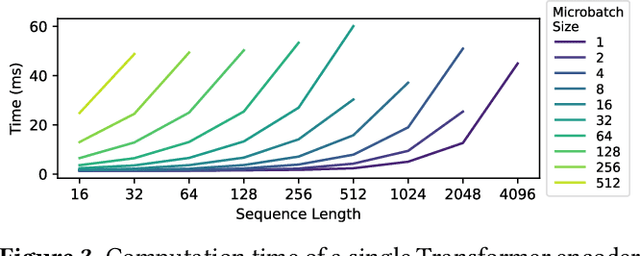Chenyu Jiang
Lancet: Accelerating Mixture-of-Experts Training via Whole Graph Computation-Communication Overlapping
Apr 30, 2024



Abstract:The Mixture-of-Expert (MoE) technique plays a crucial role in expanding the size of DNN model parameters. However, it faces the challenge of extended all-to-all communication latency during the training process. Existing methods attempt to mitigate this issue by overlapping all-to-all with expert computation. Yet, these methods frequently fall short of achieving sufficient overlap, consequently restricting the potential for performance enhancements. In our study, we extend the scope of this challenge by considering overlap at the broader training graph level. During the forward pass, we enable non-MoE computations to overlap with all-to-all through careful partitioning and pipelining. In the backward pass, we achieve overlap with all-to-all by scheduling gradient weight computations. We implement these techniques in Lancet, a system using compiler-based optimization to automatically enhance MoE model training. Our extensive evaluation reveals that Lancet significantly reduces the time devoted to non-overlapping communication, by as much as 77%. Moreover, it achieves a notable end-to-end speedup of up to 1.3 times when compared to the state-of-the-art solutions.
DynaPipe: Optimizing Multi-task Training through Dynamic Pipelines
Nov 17, 2023



Abstract:Multi-task model training has been adopted to enable a single deep neural network model (often a large language model) to handle multiple tasks (e.g., question answering and text summarization). Multi-task training commonly receives input sequences of highly different lengths due to the diverse contexts of different tasks. Padding (to the same sequence length) or packing (short examples into long sequences of the same length) is usually adopted to prepare input samples for model training, which is nonetheless not space or computation efficient. This paper proposes a dynamic micro-batching approach to tackle sequence length variation and enable efficient multi-task model training. We advocate pipeline-parallel training of the large model with variable-length micro-batches, each of which potentially comprises a different number of samples. We optimize micro-batch construction using a dynamic programming-based approach, and handle micro-batch execution time variation through dynamic pipeline and communication scheduling, enabling highly efficient pipeline training. Extensive evaluation on the FLANv2 dataset demonstrates up to 4.39x higher training throughput when training T5, and 3.25x when training GPT, as compared with packing-based baselines. DynaPipe's source code is publicly available at https://github.com/awslabs/optimizing-multitask-training-through-dynamic-pipelines.
dPRO: A Generic Profiling and Optimization System for Expediting Distributed DNN Training
May 18, 2022



Abstract:Distributed training using multiple devices (e.g., GPUs) has been widely adopted for learning DNN models over large datasets. However, the performance of large-scale distributed training tends to be far from linear speed-up in practice. Given the complexity of distributed systems, it is challenging to identify the root cause(s) of inefficiency and exercise effective performance optimizations when unexpected low training speed occurs. To date, there exists no software tool which diagnoses performance issues and helps expedite distributed DNN training, while the training can be run using different deep learning frameworks. This paper proposes dPRO, a toolkit that includes: (1) an efficient profiler that collects runtime traces of distributed DNN training across multiple frameworks, especially fine-grained communication traces, and constructs global data flow graphs including detailed communication operations for accurate replay; (2) an optimizer that effectively identifies performance bottlenecks and explores optimization strategies (from computation, communication, and memory aspects) for training acceleration. We implement dPRO on multiple deep learning frameworks (TensorFlow, MXNet) and representative communication schemes (AllReduce and Parameter Server). Extensive experiments show that dPRO predicts the performance of distributed training in various settings with < 5% errors in most cases and finds optimization strategies with up to 3.48x speed-up over the baselines.
 Add to Chrome
Add to Chrome Add to Firefox
Add to Firefox Add to Edge
Add to Edge